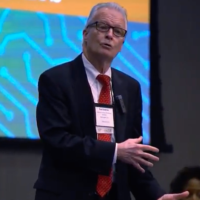 In early May 2018, the Philanthropy Roundtable held their Better Skills, Better Jobs conference in Dallas, TX. They brought dozens of philanthropic organizations together to discuss the role philanthropy will play in the workforce development efforts of now, and the future.
In early May 2018, the Philanthropy Roundtable held their Better Skills, Better Jobs conference in Dallas, TX. They brought dozens of philanthropic organizations together to discuss the role philanthropy will play in the workforce development efforts of now, and the future.
National Fund President and CEO Fred Dedrick kicked off the Better Skills, Better Jobs: Philanthropic Strategies panel discussing the need for a new model for workforce development. This new model needs to focus on three distinct areas. First, there needs to be a partnership with industry. Second, workforce development must be connected to economic development. Lastly, the barriers of entry to the labor market must be reconsidered. The panel further discussed the role philanthropy can play in the shaping of this new approach to workforce development.
Andrea Glispie, the Director of Pathways to Work – the National Fund’s regional funder collaborative in Dallas– offered insight into how her organization was working with “thought leaders” in the Dallas region. By bringing together funders, employers and community leaders, Pathways to Work has leveraged the grants they have received to develop pilot programs, invest in the improved job quality of frontline workers and facilitate burgeoning industry partnerships. Philanthropic investment has given Pathways to Work the ability to build the capacity needed to drive the next generation of workforce development efforts in the greater Dallas region.
Michelle Thomas, a VP of Global Philanthropy at JP Morgan Chase, discussed the investments they have made in Dallas, and local workforce efforts across the country. Recently, JP Morgan has targeted investment in what was described as “city strategies.” Every city is unique and has its own needs, and getting local buy-in from employers and community leaders is a key to improving the jobs of workers in their communities. In Dallas, there is a desperate need for skilled workers in IT and Healthcare. By working with organizations like Pathways to Work, large philanthropic organizations, like JP Morgan, have the opportunity to make investments in the areas of most need for a region. This investment goes further than just the livelihood of workers, but will also impact the entire economy. Having a finger on the pulse and knowing where investment dollars will go further is key to improving a regional economy.
Finding the right philanthropic investment strategy to tackle many of the systemic problems endemic to Dallas continues to be a major struggle according to Wende Burton, Community Philanthropy Director at the Communities Foundation of Texas. The geographic and ethnic/racial segregation in Dallas continues to be a major barrier in equality-of-outcomes, as outlined in a recently published report. Education was thought to be the silver bullet to solving this issue, but she pointed out that recent studies showed that a person of color in Dallas needs to achieve one level of educational attainment higher than a white person, to achieve the same economic outcomes. To solve many of these issues, philanthropy can step in where the government fails. But finding where that investment can be best served, continues to be somewhat elusive. Working with regional funder collaboratives can help philanthropic organizations find these weak spots and target investment in a smarter and more effective manner.
As the workforce development field rethinks its approach, philanthropy has an opportunity to lead the way. As Fred Dedrick said in his remarks, “The foundations get together around the table and start comparing notes. And that collaboration changes the way they make investments locally.” Bringing more local voices to the table can help direct philanthropic investment a more make substantial impact. By collaborating, and working with employers, community leaders, educators, workers and more, philanthropy can begin the transition to the next generation of workforce development.
See the full panel recording here.





